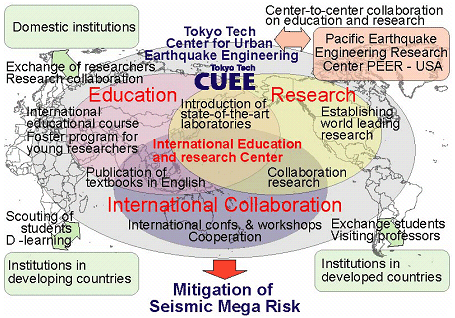Outline
Outline of plan for establishing COE
This Global COE (G-COE) program, to be operated at the Center for Urban Earthquake Engineering, Tokyo Institute of Technology (Tokyo Tech), aims not only to promote research for mitigating seismic mega risk confronting modern huge cities in earthquake regions of the world but also to strengthen graduate and post-doctoral educational programs as well as to disseminate research outcomes worldwide. The main areas of focus to make the center one of the important international hubs of earthquake engineering are as follows:

- Advancement of Urban Earthquake Engineering Research to Mitigate Seismic Mega Risk
Urban Earthquake Engineering research to mitigate seismic mega risk will be advanced by integrating technologies for creation, renovation, and recovery of an earthquake-proof society. Such technologies will be developed with the collaboration of domestic and overseas universities and research institutions. The research areas include: (1) Innovation technologies for earthquake disaster mitigation, effectively applicable to solve emerging problems with seismic mega risk, (2) Renovation technology for urban earthquake resilience, effective in reducing various seismic hazards in existing mega-cities, and (3) Management technology for earthquake disaster mitigation, effective in restoring functions of urban facilities and/or minimizing secondary disaster/disaster chains after the occurrence of a catastrophic earthquake.
- Graduate Program to Foster Internationally Active Researchers and Specialists
An International Graduate Program on Urban Earthquake Engineering will be established by combining the existing doctoral program on Urban Earthquake Engineering with the new integrated doctoral program for producing international specialists on earthquake disaster mitigation. The latter, starting in 2008, is funded by the Japanese government to the level of providing full-coverage scholarship to as many as 25 foreign students. The International Graduate Program is intended to diversify its educational mission for Japanese students, foreign students, and professionals, through course teaching, research supervision, and participation in international workshops and research collaborations with other institutions, all of which will be carried out by Tokyo Tech faculty members in collaboration with professors and researchers at both domestic and oversea institutions.
- Support System for Production of Outstanding Graduate Students and Young Researchers
Strategic measures will be introduced to create environments enabling graduate students and young researchers to build creative minds and to grow academically. Extensive financial support will be provided including: scholarship and research assistantships, funds to participate in international research projects and workshops, and research funds based on competitive proposals. Other measures will also be taken for recruiting outstanding foreign students and post-doctoral students who have strong potential to become internationally active researchers/specialists. They include web-based advertisements for the prospective students through the Internet, requests to co-operating universities and institutions for identifying outstanding students, and direct scouting of promising students who have performed excellently in internet-based Earthquake Engineering courses offered by Tokyo Tech to Asian universities.
- Advancement of Education and Research Environments
Although major construction companies and public research institutes in Japan possess world-class laboratories, most universities in Japan have only limited facilities for education and research in Earthquake Engineering. In order to improve the quality of education and research, it is essential to improve the research facilities at Tokyo Tech. Some of the state-of-theart world-class laboratories for Earthquake Engineering will therefore be introduced/upgraded. The proposed program will include management and operational systems that make the laboratories accessible to researchers not only in but also outside Tokyo Tech.
- Enhancement of International Collaborations in Research and Education
According to the collaboration agreement made with Pacific Earthquake Engineering Research Center (PEER), led by the University of California, Berkeley, the cooperation in the following categories shall be made to enhance education and research activities in earthquake engineering:- Exchange of students and researchers, including post-graduate students conducting research, attending courses, and integrating into academic activities at each institution.
- Organization of academic meetings, symposia and workshops that bring students, professionals and researchers together to exchange knowledge and research findings.
- Carrying out joint research in areas of mutual interest, including coordination of earthquake reconnaissance and large-scale experimental testing activities.
A similar arrangement of international cooperation shall be expanded to other organizations in North America, Central America, South America, Asia, Oceania, and Europe, generating an international network of education and research in earthquake engineering.
- Dissemination of Research and Education Outcomes to International Society
The program will promote intensive information dissemination and technology transfer, as well as establishment of an international network for young researchers. These will be made possible by organizing international conferences, workshops, and publication of English textbooks on research outcomes. In order to publicize the research outcomes to practicing engineers and citizens, a database and online web home-page on Urban Earthquake Engineering will be constructed. In addition, citizenfs seminars and open courses on Urban Earthquake Engineering will be conducted on a regular basis.
